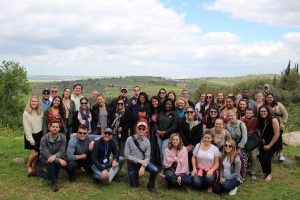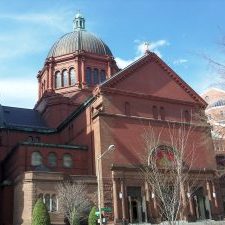Most of this blog post is from my colleagues Alex Lemann and Rebecca Blemberg who joined Natalie Fleury (our fabulous DR program coordinator) and me on the trip. It was such a delight to have them with us on this great and educational adventure. And, as they note, we are all likely returning with more questions rather than less. Here is one last group pic:

It is hard to believe that a month has gone by since we returned from Israel. On one hand, the experience was so intense and meaningful that it feels like it just ended. On the other hand, it was so far outside our normal experience that it immediately felt foreign, such that looking back now it almost feels like it was all a dream.
We have all had time to rest and reflect since we got home, and we even got the chance to gather socially for a potluck dinner. Seeing everyone again has been a great joy; there is a special bond between us now that we hope will be lasting. Initially, we wondered what it would be like to travel with 40 students. To our delight, we were warmly received by students and welcomed into serious conversations, joyful silliness, and everything in between. (We are grateful we got to travel with such wonderful students.)
One thing that has been particularly interesting upon our return has been following the news from Israel. Many students have been sending articles on current events to our (still vibrant!) group chat. Much of the news from the Middle East has a new immediacy that it lacked before our visit. We also feel informed and aware of the issues in a much deeper way than we were before. Reading that the Trump administration recognized Israeli sovereignty over the Golan Heights mere days after being there ourselves, for instance, was almost surreal. And Benjamin Netanyahu’s reelection, a week after he promised to annex Israeli settlements in the West Bank, has given us all a lot to think about.
Alex: I still haven’t been able to shake something we heard on our very first night in Israel, from Dr. Alick Isaacs. Dr. Isaacs is the co-director of Siach Shalom, which works to create a dialogue about peace that builds on a foundation of deep respect for and understanding of the fervently-held religious beliefs of people on both sides. This type of emphasis feels very foreign to us as Americans, something Michael Karayanni, Dean of the faculty of law at Hebrew University, echoed on our very last day. To many Americans, the problem of peace between Israel and Palestine (and in the region more generally) can seem like an interesting puzzle, one whose solution lies in figuring out how to fit the pieces together (or perhaps divide them up) in just the right way. Dr. Isaacs suggested that to people of faith, the Holy Land cannot simply be divided up. It is as if, he said, two people found a Torah (a bible scroll) at the same time. Cutting the Torah in half is simply unthinkable; another way to share must be found.
Rebecca: The question that stays with me also came up at Dr. Isaacs’ talk, after he gave a powerful account of people meeting together after an act of violence and finding empathy for one another. Student Shayla Sanders asked how peacemakers can bring that deep empathy we experience when we interact as individuals into more large-scale political questions that consider group interests. That question stayed with me when we heard Adam Waddell from EcoPeace speak about sharing resources and social space and “being human with one another” despite differences. I thought about it again when Genevieve Begue from the Shutafot Coalition for Economic Equality spoke to us at Juha’s Guesthouse in Jisr al Zarqa and stated that sharing personal and even painful experiences bridged some cultural divides and helped create trust needed for a social business seeking to empower impoverished women and children. Again it came up at Kuchinate, a refugee women’s collective, in Jaffa. Refugees shared their personal stories with our group, and I will never again think about political questions concerning refugees and status without remembering these two brave women.
Where thoughts like these lead us is open to interpretation. One benefit of understanding a problem more deeply is that easy answers are no longer satisfying. At the very least we all feel that we all understand so much more than we did when we left, not only about Israel but maybe also about the human condition.
We can’t resist closing with a big Thank You to Professors Andrea Schneider and Natalie Fleury for all the work they put into this incredible class trip!
And thanks to all of our students for their wonderful reflections and our blog readers for their attention–feel free to reach out with any comments or questions. We hope that the blogs gave you a sense of the range of our trip and what we learned. What you might not have picked up is how much fun this was (for me too!) and how much I enjoyed. With much appreciation to Marquette Law School and our extra trip funders for supporting this!
Cross-posted at Indisputably.org .
 [The following is a guest post from Daniel Suhr ’08, a prior guest alumni contributor to the Blog.]
[The following is a guest post from Daniel Suhr ’08, a prior guest alumni contributor to the Blog.]
